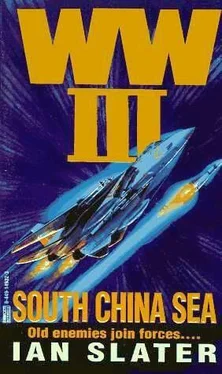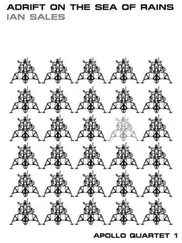“Well,” Cline said, “at least we can go in over Dien Bien Phu with TACAIR.”
“When this foul weather clears — if it ever does. Thing I’m most worried about is that damn no-stop supply train Wei has at his service. Like having a damn Wal-Mart at his beck and call.”
“We can’t send troops across the line, General.”
“No, damn it, but we can try pushing their butts past it.”
* * *
Near Dien Bien Phu, Colonel Berry’s men were making their way back toward Delta when they ran into a squad of PLA hauling a wheel for an artillery piece. Both sides instantly disappeared, except for the man with the wheel, and he was dead in seconds, his body having literally disintegrated on the trail.
Both sides went quickly into defensive positions and froze. It looked like it was going to stay that way for quite a while, until another PLA squad came across the first, took their cue from the one downed wheel, and evaporated into the mist-shrouded jungle, each side knowing that come nightfall the other side would be laying trip wires and mines.
The Chinese had the best of this situation, because Foxtrot had to get past them before they reached the Dien Bien Phu valley.
On the far side of the valley, five to six miles away and high above the valley floor, elements of Wang’s Chengdu army had already installed several AA batteries of SU-23-2 twin 23mm guns, each twin capable of firing two thousand rounds a minute, should any American aircraft be foolhardy enough to come down into the mist-roofed valley. Along with the SU-23mm, there were banks of M1938 12.7mm dual-purpose machine guns set in the antiaircraft configuration, threatening any chopper that came within three thousand feet with six hundred rounds of flak a minute.
The Chinese paras had brought the dual-purpose 12.7mm guns, but the much heavier four-crew 23mm AA guns, whose wheels collapsed in the firing position, had been hauled by vehicle as far south as possible from Mengzi in China, then manhandled by the infantry over torrential rain-swollen rivers and poor secondary roads to Dien Bien Phu. But for the Chinese, the “piece de la resistance,” as Pierre LaSalle reported gleefully, was the Chinese 122mm self-propelled howitzer, whose range, over 22,000 meters, meant they could “pummel,” as LaSalle put it in Le Monde, any American-USVUN position in the valley. It was also mounted on a PT-76 tank chassis with an in-water speed of ten kilometers. And these were only the guns that Delta’s Ranger scouts had pinpointed.
There was no doubt in Freeman’s mind that the Chinese did not merely want to defeat Freeman’s Special Forces at Dien Bien Phu, but were intent on humiliating the Americans as the Viet Minh had the French almost fifty years ago. Whoever won Dien Bien Phu would eclipse the famous General Giap, would defeat the white man again. For the French, an American defeat would not only exonerate France for the loss in ‘54, but would, as Pierre LaSalle put it, “cut the Americans down to size.” The only hope the Americans might have, Freeman knew, was TACAIR support, and even then it would be touch and go, so long as the valley was locked in by foul weather.
“Goddamn it!” Freeman said, venting his frustration. “On my northern front at Disney I’ve got clearing conditions, though it’s still raining, but I can’t send U.S. aircraft across the parallel. On my western flank, where I’m allowed to use TACAIR, I have foul weather, locking in our flyboys and our ground forces. Life isn’t fair, Major.”
“No, sir. But there is another alternative.”
“You suggest it,” Freeman said, “and I’ll cut you off at the waist!” Before Cline could say anything, Freeman said it for him. “I know there are only about nine thousand of our boys, and maybe ten, twenty times that many Chinese around us, but the international political situation we’d create if we were to surrender, to give up without a fight, would be—” He paused. “—catastrophic! The world’s superpower beaten by chinks. Good God, if that happened, we might as well give up on any oil claim anywhere in the world’s oceans, and not just in the South China Sea. No one would take us seriously. Might as well say, ‘Take the Spratlys, take the Paracels — take any damn thing you like!’ No one could rely on us.”
His fist slammed against the map and caused a six on the Richter scale from Dien Bien Phu to Ningming. “No, Bob, whatever happens, we have to hold at Dien Bien Phu, and we have to push the bastards back at Disney. There’re only two points of battle along the whole line — I realize that — but they are the two plays the whole world is watching. If we win them, we win them all. They’re the two hard-ass cases. Besides, if you hadn’t noticed, we haven’t yet rescued one single MIA!”
The general walked back and forth, pausing every now and then to thwack his jodhpurs with a riding crop. It was an affectation he took from Patton, as Patton had taken his from others. Abruptly, he turned to Cline. “Heard some damned sitrep last night saying some of our boys atop Disney could see horses — through the big binoculars.”
“Horses?” Cline said.
“Horses!” Freeman repeated. “Don’t know what that frog reporter’ll make of it. That kind of Frenchman would love to see us lose. Probably say all we have against us is Chinese cavalry.”
* * *
It was Chinese cavalry, used largely as packhorses nowadays to subdue minorities, such as the Tibetans, in hard-to-get places. But this day they were hunting the POWs from what official communiqués to the Zhongnanhai HQ in Beijing were calling the breakout at Ningming. Upshut was told bluntly by the Ningming divisional commander that he would be executed for gross negligence of duty unless all forty-two — the morning count had found another five missing — POWs were recovered, dead or alive.
Already he had caught seventeen — women and mostly older men, Americans, Australians, and Brits, ex-rig foremen, beer bellies, out of condition, and nothing but boiled rice and swill since their captivity.
“Seventeen,” Upshut repeated proudly if nervously to the divisional commander.
“Good, comrade. That only leaves twenty-five unaccounted for.”
The horses and riders were getting tired, but Upshut kept them at it. Any man who failed to catch a prisoner would be executed.
* * *
Of the remaining twenty-five, most of them, including Mike Murphy, Trang, Shirley Fortescue, and Danny Mellin, were nearest the railway, shivering, chilled, and hungry. But at least the cavalry were not paying the area near the tracks much attention, leaving it instead to the guards, one posted by Wei every fifty yards along the length of the rail line.
Danny Mellin and Shirley Fortescue were ahead of Murphy and Trang, wading in the paddies adjacent to the Ningming-Xiash road, the rain still falling. It brought with it a mist that, with the turbulence in the paddies caused by the rain, would hide them from view unless they were to get too close to the flooded road.
Despite the chill and the slimy leeches they could feel sucking blood from every part of their bodies, they did not let up. Mellin and Shirley were now closer to the road than Murphy and Trang, Mellin whispering to Shirley that he was going out to get them.
“Why? Aren’t they safer the farther out they are?”
“This paddy is giving way to flooded fields where there’ll be more cover as—”
“You mean we have to wade for fourteen miles to the border?”
“No. Sooner we can get onto the unflooded part of the road between Ningming and Xiash, the better, but I might need Mike’s help.”
“Doing what?”
“I’ll explain later,” Mellin said, and nodded to one of the many tree islands, about a quarter mile from a long section of road that, unlike the elevated rail line above it, was well underwater, several trucks bogged down. “Wait over there for us. Rest up a bit. Won’t be long.”
Читать дальше












